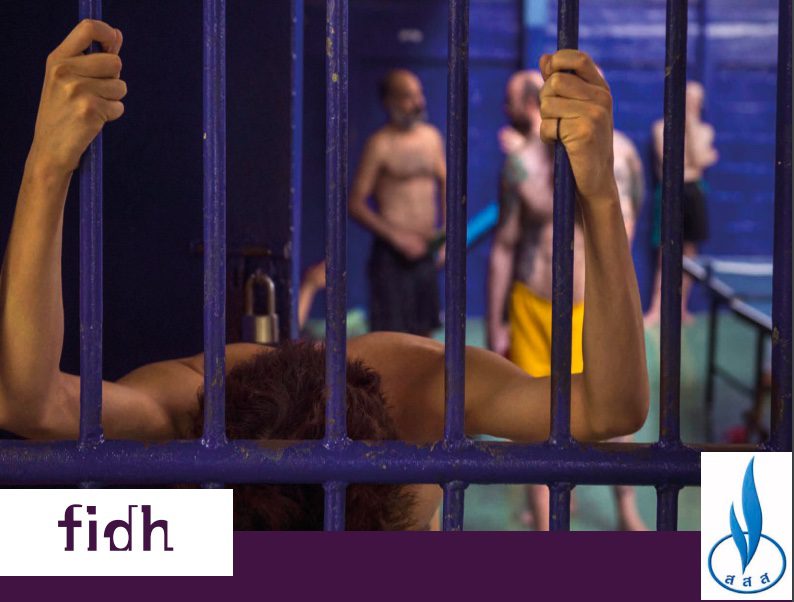
Out of Sight: Human rights violations in Thailand’s immigration detention centers
Executive summary
Thailand’s 22 immigration detention centers (IDCs) are among the country’s most secretive places of detention. Obtaining reliable and up-to-date information about IDCs and conditions in these facilities is extremely difficult. The Immigration Bureau of the Thai police, which administers the IDCs, does not make public the data on the number of IDCs, their locations, and the number and origin of the detainees. Access to IDCs for media and independent monitoring organizations is severely restricted.
Based on interviews with recently released detainees, this FIDH-UCL report provides a glimpse into conditions in the IDCs. Conditions in these facilities have been and remain well below relevant international minimum standards. IDCs are characterized by severe overcrowding, which is reflected in the 155% occupancy rate of the immigration detention system.
Most interviewed former detainees reported being kept in squalid cells with minimal personal living space. These conditions were compounded by: punishment, abuse, and ill-treatment of detainees; lack of access to basic hygiene supplies, particularly for women; food of poor quality; severely limited availability of adequate healthcare, which in some cases proved fatal; lack of recreational activities; and limited contact with the outside world.
The FIDH-UCL report also analyzes Thailand’s failure to establish a legal framework and policies on immigration detention that comply with international human rights law and standards.
The Immigration Act, promulgated in 1979, is the primary law that governs migration management in Thailand. The Act, which is under the administration of the Prime Minister and the Minister of Interior, grants authorities sweeping discretionary powers to detain “immigrants” for unauthorized entry and stay, without having to consider their individual circumstances or other non-custodial alternatives to detention. The all-encompassing category of unauthorized immigrants includes refugees, asylum seekers, stateless persons, victims of human trafficking, and others in situations of vulnerability.
The lack of a legal framework and protection policies has led to a precarious situation for refugees and asylum seekers. They have been subject to arrest, prosecution, detention in IDCs, and deportation. They have also been denied access to basic rights guaranteed under international human rights law.
For the past several decades, Thai authorities have also violated the internationally recognized principle of non-refoulement on many occasions when they deported refugees and asylum seekers – including Hmong, Uyghurs, Rohingya, and Cambodians – back to their countries of origin where they faced persecution.
The Immigration Act does not define a limit to the period of detention in the context of pending deportation proceedings. This has allowed for prolonged or indefinite detention, which is considered arbitrary under international law. This situation is made worse by the fact that detainees in IDCs do not have the right to challenge the legality of their detention and/or to a judicial review of the administrative decision concerning their detention, which are fundamental safeguards against their arbitrary deprivation of liberty. Lastly, there are no legal provisions that prohibit the detention of migrant children.
Initiatives undertaken in recent years by the Thai authorities to address some of these shortcomings have fallen short of their objectives. The establishment of a National Screening Mechanism (NSM) in 2019 to provide protection to foreign nationals who are facing, or are at risk of, persecution if returned to their countries of origin, has been undermined by the exclusion of certain individuals – including migrant workers from Myanmar, Laos, Cambodia, and Vietnam. In the same year, the signature by seven Thai agencies of a Memorandum of Understanding (MoU) to end the detention of migrant children in IDCs has led to a significant reduction in the number of refugee and asylum seeker children detained in urban areas. However, migrant children have continued to be subject to arrest, detention, and deportation, as the MoU’s provisions only apply once the children have been taken into custody by the immigration authorities.
On a positive note, with the entry into force of the Prevention and Suppression of Torture and Enforced Disappearance Act in February 2023, Thailand has not only codified the principle of non-refoulement, 4 FIDH/UCL – OUT OF SIGHT: Human rights violations in Thailand’s immigration detention centers but also established legal and procedural safeguards against torture, ill-treatment, and enforced disappearance, which are applicable to immigration procedures and the deportation process.
This report makes numerous recommendations to the Thai government, the National Human Rights Commission of Thailand (NHRCT), and United Nations (UN) member states aimed at improving conditions in the IDCs and establishing a robust legal framework that conforms to international human rights law and standards, including for the protection of refugees, asylum seekers, and other migrants in vulnerable situations.
